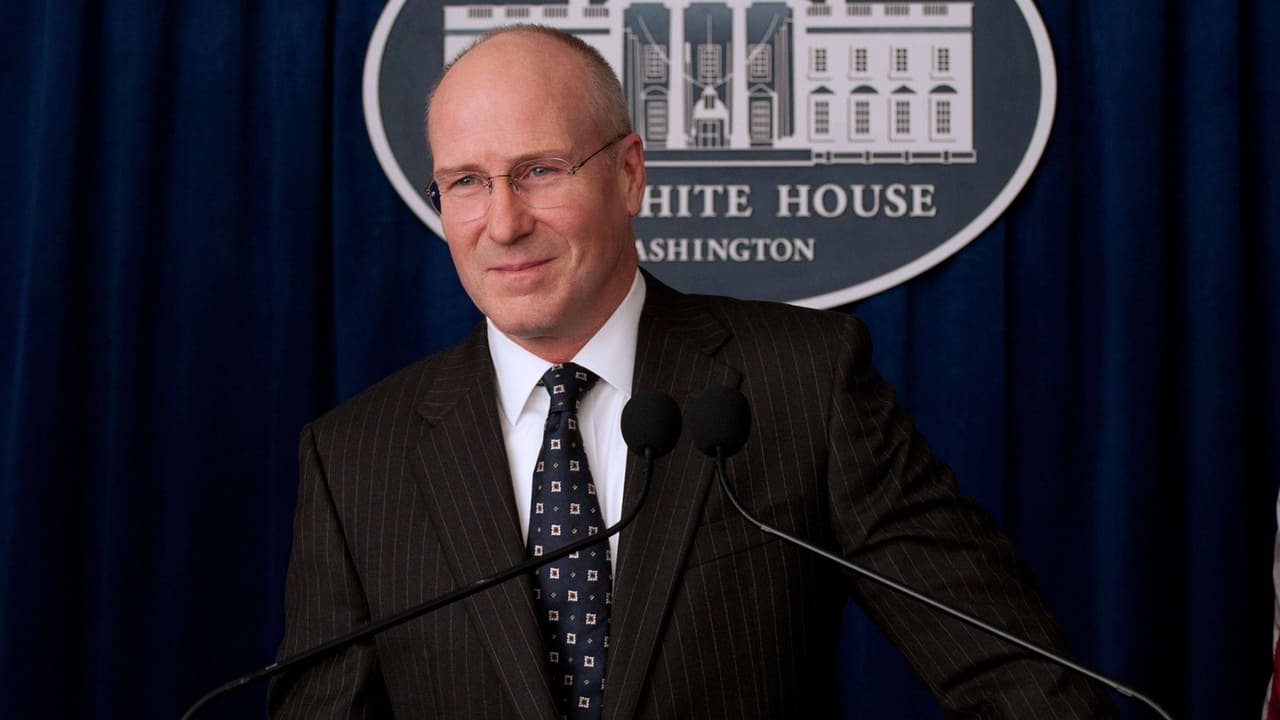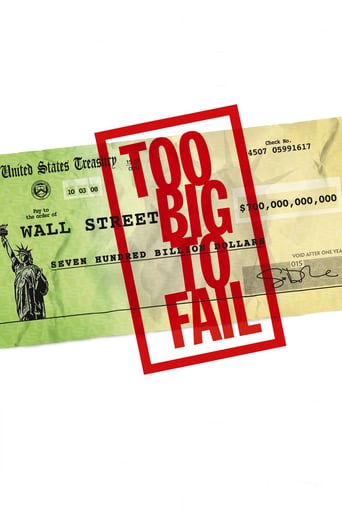

The movie itself was put together very well following the chronicles of the fiasco that unfolded during the credit crunch. Where it went horribly wrong is by humanizing Hank Paulson. Making him seem vulnerable and genuine and sincere. It has recently been published that Saint Paulson tipped off 20 or so hedge funds about the coming collapse so they could unload their positions. And this film is attempting to portray him as the victim and the hero and laud him with applause for working so diligently on this problem. His colleagues at Goldman cleaned up on the CDS contracts betting on the inevitable crisis they knew was coming. James Woods did a very good job at making Dick Fuld's loathsome character believable, though.
... View MoreThis movie is good--one of the best on the financial crisis other than Inside Job. It goes into many of the most interesting details and decisions of the crisis while staying entertaining.My problem with the film is that it makes it look like the politicians and CEOs involved in the decisions actually cared and got emotional about them. In reality, that is not the case. The decisions which greatly affected the lives of millions of Americans had little, if any, effect on the people who made them--hence the distinguishable apathy in their public appearances. These men and women are among the richest in the world, and they knew they would stay that way regardless of how the crisis played out. They cared about the crisis only to the extent that they needed not be late for their dinner dates.All animals are equal But some animals are more equal than others.
... View MoreAs a financial adviser, I have two very different thoughts on "Too Big to Fail".First, I was fascinated by the human element - the relationships between decision-makers, the communication, the uncertainty, the failings and doubts we all possess. We all read the headlines, but rarely are we given even the slightest insight about the decision-making processes that affect us all.Second, and unfortunately, the story is told with such obvious omissions and distortions that it is clear writer Andrew Ross Sorkin not only carries a partisan grudge, but made little attempt to hide that grudge in the script. Just a few examples of many: 1. One clear "villain" of the meltdown was the American consumer - those who willingly purchased homes they quite well knew they couldn't afford, took advantage of 125% refi's to pay off credit cards so that they could run them up again, tapped into their equity for trips, cars, boats and other goodies, etc. Instead, they were clearly portrayed as victims, and the only time a reference is made to them is when the biggest villain in the film, Dick Fuld, is scoffing at them.2. Legislators Barney Frank and Chris Dodd, who are documented to have made errors in judgment leading up to the crisis, are portrayed as having absolutely nothing to do with it, completely stunned that this was happening - worse, they come off as passionate defenders of the people. Only someone who knows absolutely nothing of this crisis would fall for this. Come on, Mr. Sorkin.3. Then-SEC Chairman Christopher Cox, the highest-profile Republican in the story, is portrayed as a bumbling, indecisive, oafish fool. If the rest of the film were not so left-leaning, this portrayal may not have been so obvious. Instead, it falls right in line with the rest of the partisan approach.4. When assistant Michele Davis asks why regulators failed to notice and act upon the blatant problems in the mortgage industry, Hank Paulson sheepishly responds, "because we were making too much money." What?! The federal government failed to do its job because some people were making a lot of money? Wouldn't an indictment of such magnitude warrant a much larger inspection during this movie? Instead, it's just passed off as "greed". Astonishing.5. Blame for the entire economic meltdown is placed in one place, and one place only: Those Evil Banks. Not one ounce of blame (outside of the ridiculous statement in #4, above) is placed on the massive failure of regulators to do their job; on the consumers who willingly signed on the dotted line, on the bureaucrats from both parties who pushed Fannie Mae and Freddie Mac to make bad loans in the interest of "fairness." I could go on. In short, partisan politics (from BOTH sides) have so polluted our everyday culture that it's now impossible to believe anything you hear, read or see. "Too Big To Fail" is a vivid example.Here's the problem: This film had a chance to teach us critical lessons about the financial meltdown. An accurate approach could have served as a road map for the future, a warning siren to everyone from politicians to Wall Streeters to regular citizens on the dangers of personal greed, of poor political leadership and of the need for more effective regulation of financial markets.Instead, it's just another political statement disguised as "fact". What a shame..
... View MoreYou can look at a movie like this two ways: as an accurate representation of the source and as a piece of drama. Too Big To Fail is not too big to fail on both counts.I should have known to expect with a cast that sports the likes of Ed Asner, but the degree of the left-wing Hollywood spin that they put on the story was stilling annoying. They just can't let go of a chance push their ant-business agenda, even if it means inventing new scenes and even directly contradicting the source book itself. Talking about painting the lilly! Exhibit #1: There was an invented scene about 2/3 of the way through the film apparently designed to explain the roots of the calamity. They throw around terms like CDO and CDS so fast that anyone unfamiliar with the book and the background to the financial crisis would have no clue what they were talking about. They then whitewash the home owners as victims, just poor dupes swindled by the unethical mortgage brokers. In reality, of course, many of these were greedy people living way beyond their means using their houses as piggy banks while many others were pure speculators. We don't hear anything blame about the likes of left wing heroes Barney Frank and Charles Shumer who lit the fuse on the whole mess by demanding that banks make mortgages available to the poor. There is not a word about the Quants whose unrealistic risk models told bankers that such a disaster could never happen. We don't hear about the corruption of the ratings agencies, collapse of the carry trade, etc. No, there is only room for one villain in the Hollywood left villain pantheon – big business CEO's.Exhibit #2: The ending is another invented scene that is thoroughly misleading. They have Paulson pleading that he hopes that the banks will lend out the TARP money as intended to stimulate the economy. Then there is a prologue saying that the banks didn't. This is pure rubbish. In the book, Sorkin makes it perfectly clear that this was not the purpose of TARP. It was to stabilize the financial world by injecting capital to deleverage the banks and to rebuild investor confidence. The banks could not lend money because it would push their leverage back up. But Hollywood isn't interested in what Sorkin said, if they can take another parting potshot at big business.Leftwing distortions aside, Too Big To Fail was simply very dull. For a while, it is amusing to see actors who look so much like their real-life counterparts, especially Paul Giamati as a Ben Bernanke clone and Evan Handler's amazing resemblance to Lloyd Blankfeld. But the characters are uniformly dull. Even scene that should be great theater (e. g., Paulson kneeling before Nancy Pelosi) come across a dead and perfunctory. The only breaking in the dullness is James Woods' way over the top portrayal of Dick Fuld. It bordered on comic relief.The book just didn't work as a movie. The book was a series of vignettes, whose complexity reflected the complexity of the actual crisis. The story lurches from vignette to vignette with not real plot or story developing. Further, the need to boil the book down into typical movie running time also meant that they drastically has to simply and shorten many of the events to the point of losing the real story. The collapse was not the kind of linear event that works on the screen.In sum, the movie fails as both history and as drama. A much better movie about the financial disaster could have been made from Michael Lewis's highly entertaining "The Big Short," that amusingly tells the story from the viewpoint of a few quirky Wall Street outsiders who saw the collapse coming and the problems that they encountered by running contrary to popular wisdom. It's the same story, but a lot more fun. But there would have been some sympathetic businessmen characters. The Hollywood lefties wouldn't want that.
... View More